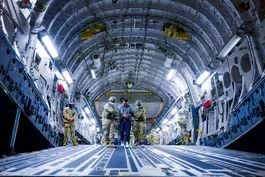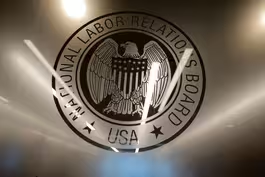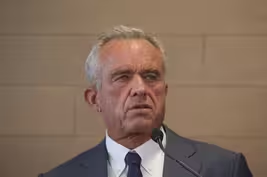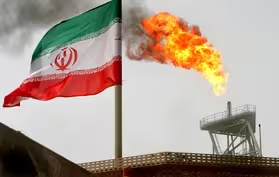
Activist supports Sudanese sexual violence survivors
Clip: 4/16/2025 | 9m 7sVideo has Closed Captions
Activist provides support for Sudanese refugees terrorized by sexual violence
Amid Sudan's brutal civil war, the paramilitary Rapid Support Forces are using sexual violence to terrorize women and girls from non-Arab ethnic groups. These war crimes have sparked international outrage. Special correspondent Neha Wadekar and filmmaker Zoe Flood, with the support of the International Women’s Media Foundation, spoke with survivors and a woman determined to help them heal.
Problems playing video? | Closed Captioning Feedback
Problems playing video? | Closed Captioning Feedback
Major corporate funding for the PBS News Hour is provided by BDO, BNSF, Consumer Cellular, American Cruise Lines, and Raymond James. Funding for the PBS NewsHour Weekend is provided by...

Activist supports Sudanese sexual violence survivors
Clip: 4/16/2025 | 9m 7sVideo has Closed Captions
Amid Sudan's brutal civil war, the paramilitary Rapid Support Forces are using sexual violence to terrorize women and girls from non-Arab ethnic groups. These war crimes have sparked international outrage. Special correspondent Neha Wadekar and filmmaker Zoe Flood, with the support of the International Women’s Media Foundation, spoke with survivors and a woman determined to help them heal.
Problems playing video? | Closed Captioning Feedback
How to Watch PBS News Hour
PBS News Hour is available to stream on pbs.org and the free PBS App, available on iPhone, Apple TV, Android TV, Android smartphones, Amazon Fire TV, Amazon Fire Tablet, Roku, Samsung Smart TV, and Vizio.
Providing Support for PBS.org
Learn Moreabout PBS online sponsorshipAMNA NAWAZ: Amid's Sudan civil war in the western region of Darfur, the paramilitary Rapid Support Forces, or RSF, are using sexual violence to terrorize women and girls from non-Arab ethnic groups.
These are war crimes and have sparked international outrage.
Special correspondent Neha Wadekar and filmmaker Zoe Flood, with the support of the International Women's Media Foundation, traveled last year to interview survivors of these crimes and one woman determined to help them heal.
And a warning: This report includes graphic descriptions of sexual violence.
NEHA WADEKAR: Before war broke out in Sudan, Zahra Khamis was enjoying a peaceful life with her family in the West Darfur capital of Al-Junaynah, where she was employed as a social worker.
She now joins more than 235,000 other refugees living in this makeshift camp along the Chad-Sudan border.
Despite losing everything, Zahra is showing up for her community, especially its women.
Zahra supports women and girls targeted by militia groups in Sudan who are using sexual violence against non-Arab communities, especially the Masalit ethnic group.
ZAHRA KHAMIS, Women's Rights Activist (through translator): Sexual assault was used as a weapon to destroy our community because it's something you can't forget.
Any time you see a child who's a result of the violence, then you remember what happened.
That's why sexual violence is used as a weapon against us.
NEHA WADEKAR: It's impossible to determine how many women and girls have been targeted by ethnically motivated sexual attacks in Darfur.
The U.N. and human rights groups have tracked hundreds of incidents, the majority carried out by members of the RSF and its allies.
But the numbers are likely much higher.
Zahra herself manages a heavy caseload.
She makes house calls to identify survivors and then connects them to services.
ZAHRA KHAMIS (through translator): The number is very high.
Some are in different places.
Here, I have more than 30 cases and some are in the other camps.
I have a total caseload of 60 people that I follow, but the number is much higher than that.
NEHA WADEKAR: Twenty-four-year-old Amira is among them.
Like other survivors in this peace, we have changed her name.
She and her mother were alone at their home when four armed men barged inside and demanded that Amira join them in the next room.
"AMIRA," Sexual Violence Survivor (through translator): They called me, but I refused to go.
So they pointed a gun at my head.
When I got to the other room, he said: "Take off your clothes.
And if you don't do that, I will kill your mother."
NEHA WADEKAR: Amira says her mind disconnected from her body during the rape.
"AMIRA" (through translator): In the moment, I wasn't aware of what was going on.
Afterwards, my mother helped me put on my clothes and we left.
NEHA WADEKAR: With little financial support, Zahra has created a women's center in the camp.
She works with other Sudanese women to create a safe space for survivors in their community.
ZAHRA KHAMIS (through translator): People who have experienced sexual assault don't want to be with others.
They're always alone and sad and don't want to interact.
Once they come to the center and see others having normal conversations, they feel relaxed enough to share their stories.
NEHA WADEKAR: Nineteen-year-old Fatema also survived a horrific ordeal in which armed men raped her and eight of her family and friends, including one 16-year-old and a 12-year-old child.
"FATEMA," Sexual Violence Survivor (through translator): Among the eight who were raped, two died on the spot because they were too young.
They died in such a brutal way.
Blood was pouring out of their mouths.
NEHA WADEKAR: Experts say that sexual violence and war can impact individuals, families, communities and countries for decades to come.
"FATEMA" (through translator): Afterwards, I saw that my body was covered with liquid.
I don't know if it was blood or something else.
I was very disturbed.
I later took some medication for the pain.
A major impact for me was emotional.
I couldn't talk to people and couldn't eat.
I stayed alone in our home at the camp.
After I discovered that there is a center for women in the camp, I went there, and I have started to recover.
NEHA WADEKAR: Zahra also helps to connect survivors to medical care.
Facilities in Adre are extremely limited.
The nonprofit Doctors Without Borders, known by its front acronym, MSF, offers a range of services.
This is a mental health unit run by MSF.
In these private rooms, psychologists and mental health experts support women and girls who are survivors of sexual violence in Sudan.
The stories I'm hearing are horrifying and heartbreaking.
Women and girls are being subjected to gang rape, sexual enslavement, and many of them have become pregnant as a result of rape.
As well as treating walk-in patients, MSF runs community outreach in the camp to make people aware of its services.
Staff have to be particularly sensitive when mentioning sexual violence.
Community stigma around rape and sexual assault leads to severe underreporting.
Zahra is working hard to support women here in Chad, while dealing with her own deep trauma and loss.
ZAHRA KHAMIS: His name was Farhar Rahman.
He was 17 yeas old.
NEHA WADEKAR: Her firstborn son, Farhar Rahman Abdullah, was killed in an RSF attack as the family fled to Chad.
He was just 17 years old.
Her father was also killed while escaping from Al-Junaynah.
ZAHRA KHAMIS (through translator): He always said that he wanted to become an engineer.
He wanted to study electricity.
He was very determined and learned to speak English.
Sometimes, his friends would come over and ask, "Can your mother cook for us?"
if they wanted to take a picnic out of town on the weekend, and I would prepare food for them.
NEHA WADEKAR: Zahra lost her job, her home, her father, and her son on the same day.
But she never lost her commitment to fighting for the rights of women and girls.
She is also working with other human rights activists to try to seek justice for the survivors.
Khalid Sulemane is a Sudanese lawyer who represented survivors of violence back in Darfur, often at great personal risk.
KHALID SULEMANE, Human Rights Lawyer (through translator): For cases involving sexual violence and murder, we have always been threatened.
NEHA WADEKAR: Khalid was lucky to escape to Adre.
Other human rights lawyers were brutally murdered, targeted because of their work.
KHALID SULEMANE (through translator): There was so much violence.
They gouged out their eyes, slaughtered them.
It was very brutal, and I saw it with my own eyes.
NEHA WADEKAR: In Adre, Khalid is helping to document cases of sexual violence, while sharing information with international lawyers.
KARIM KHAN, Prosecutor, International Criminal Court: I am extremely concerned about allegations of widespread international... NEHA WADEKAR: Karim Khan, the prosecutor of the International Criminal Court, is currently investigating the ongoing violence in Sudan, with a focus on crimes relating to sexual violence and rape.
KARIM KHAN: The evidence my office has collected to date seems to show credible, repeated, expanding, continuous allegations of attacks against the civilian population.
It seems to show the widespread, prevalent use of rape and other forms of sexual violence.
NEHA WADEKAR: But Khalid knows that getting justice for the recent crimes in Darfur will be hard to achieve.
KHALID SULEMANE (through translator): In the short term, it will be difficult for the survivors to get justice, because the victims of the genocide in 2003 are still not getting justice.
NEHA WADEKAR: For women and girls who have survived rape in Sudan, the road to justice is a long and hard one.
Most, if not all of these women, will never have the opportunity to bring their perpetrators to account.
For now, all they can do is mourn what they have lost, try to recover the best they can, and adjust to their new lives here in Chad.
And, perhaps with Zahra's help, their adjustments will now be a little easier.
For "PBS News Hour," I'm Neha Wadekar in Adre, Chad.
Deportation challenge morphs into executive power battle
Video has Closed Captions
Clip: 4/16/2025 | 5m 42s | Challenge to Trump deportations morphs into a battle over executive and judicial power (5m 42s)
A look at the efforts to slash public media funding
Video has Closed Captions
Clip: 4/16/2025 | 5m 29s | A look at the Trump administration's efforts to slash public media funding (5m 29s)
NLRB whistleblower says DOGE may have caused security breach
Video has Closed Captions
Clip: 4/16/2025 | 8m 29s | NLRB whistleblower claims Musk's DOGE potentially caused significant security breach (8m 29s)
Researcher skeptical autism cause will be found by September
Video has Closed Captions
Clip: 4/16/2025 | 5m 11s | 'Good science takes time': Researcher skeptical autism cause will be found by September (5m 11s)
U.S. and Iran harden positions ahead of nuclear negotiations
Video has Closed Captions
Clip: 4/16/2025 | 4m 14s | Ahead of 2nd round of nuclear negotiations, U.S. and Iran harden positions (4m 14s)
What science shows about the rise in autism diagnoses
Video has Closed Captions
Clip: 4/16/2025 | 7m 16s | What research reveals about the rise in autism diagnoses and why vaccines aren't the cause (7m 16s)
Providing Support for PBS.org
Learn Moreabout PBS online sponsorship
- News and Public Affairs

FRONTLINE is investigative journalism that questions, explains and changes our world.

- News and Public Affairs

Amanpour and Company features conversations with leaders and decision makers.












Support for PBS provided by:
Major corporate funding for the PBS News Hour is provided by BDO, BNSF, Consumer Cellular, American Cruise Lines, and Raymond James. Funding for the PBS NewsHour Weekend is provided by...





